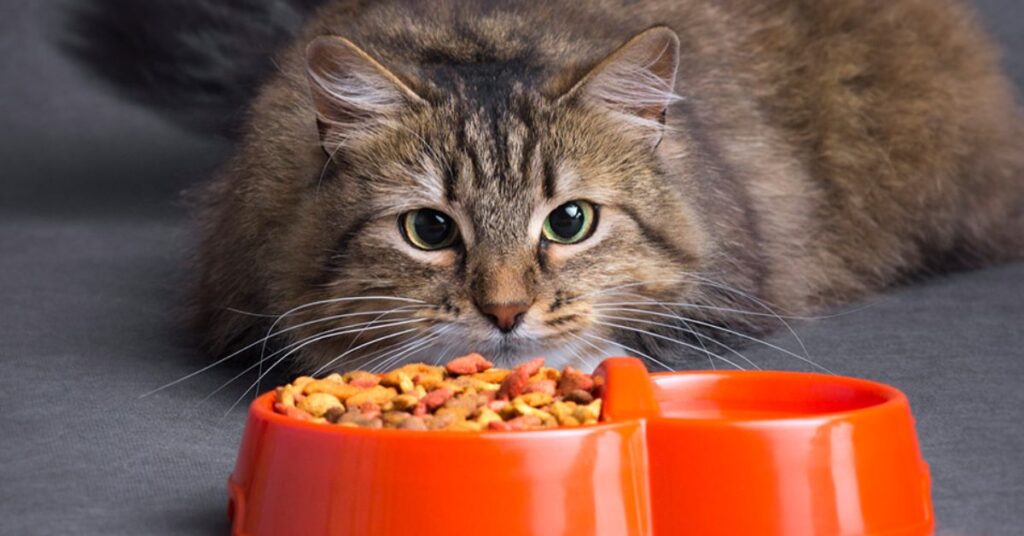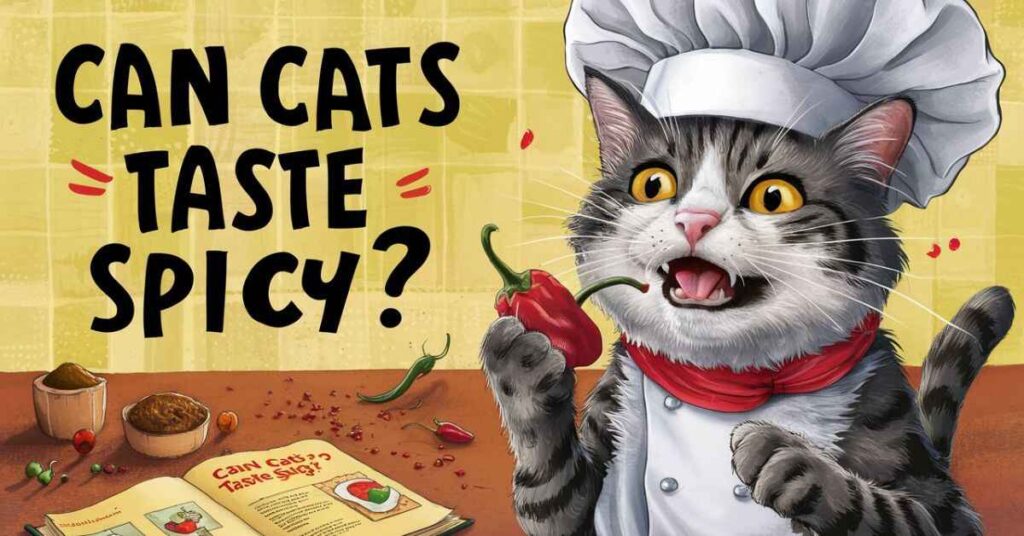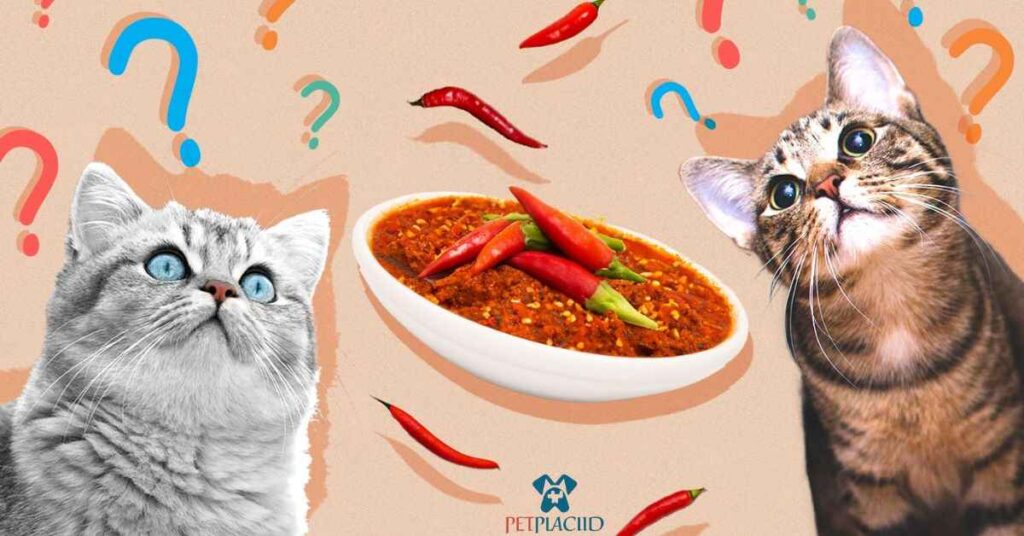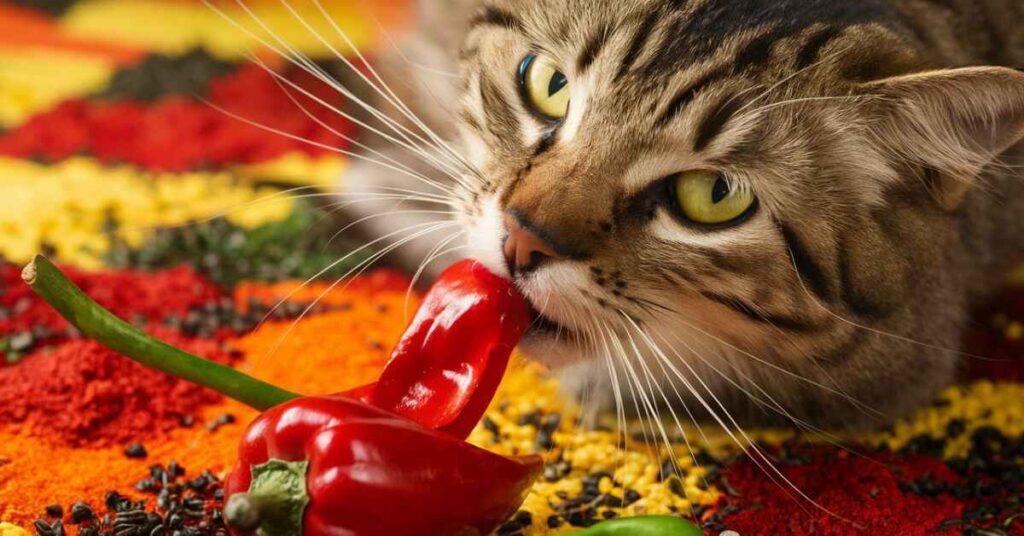Have you ever noticed your furry feline friend curiously sniffing around the kitchen when you’re cooking up a spicy dish? Or perhaps they’ve even tried to sneak a lick of your fiery hot sauce or spicy chips.
While this behavior might seem cute or amusing, it’s important to understand the potential risks of feeding spicy foods to our feline companions.
In this comprehensive guide, we’ll explore whether cats can truly taste spicy flavors, their reaction to spicy foods, and the potential dangers of indulging their curiosity.
Cat’s Taste Buds

Before we dive into the world of spicy sensations, let’s first understand how a cat’s sense of taste differs from our own.
Unlike humans, who have around 9,000 taste buds, cats only possess approximately 470 taste buds. These taste buds are primarily concentrated on the tongue, palate, and upper part of the throat.
Cats are considered “taste-deficient” compared to humans, as they lack the ability to perceive certain tastes, such as sweet flavors.
However, they are particularly sensitive to the tastes of amino acids, which are found in proteins – a crucial component of their carnivorous diet.
Can Cats Taste Spicy?
Now, let’s address the burning question: Can cats taste spicy? The answer is not a simple yes or no. While cats do possess the necessary receptors to perceive the “heat” from spicy compounds like capsaicin (found in chili peppers), their experience of spiciness may differ from ours.
Cats have a specific receptor called TRPV1 (Transient Receptor Potential Vanilloid 1), which is responsible for detecting capsaicin and other spicy compounds. However, compared to humans, cats have a lower density of these receptors, which could mean they experience spiciness to a lesser degree.
It’s important to note that not all cats react the same way to spicy foods. Some may be more sensitive than others, and their individual reactions can vary based on factors such as age, health, and personal preferences.
Cats Reaction to Spicy Foods

When cats consume spicy foods, their reactions can range from mild discomfort to more severe consequences. Here are some common behaviors you might observe:
- Excessive licking or grooming of the mouth and lips
- Drooling or foaming at the mouth
- Pawing at the mouth or face
- Vocalizations (meowing, yowling)
- Refusal to eat or drink
- Vomiting or diarrhea
It’s important to note that these reactions can be signs of distress, and prolonged exposure to spicy foods can lead to more serious health issues.
Risks of Feeding Spicy Food to Cats
While a small amount of mildly spiced food may not cause immediate harm to some cats, regularly feeding them spicy foods can pose significant risks to their overall well-being. Here are some potential dangers to be aware of:
- Digestive Issues:
Spicy foods can irritate a cat’s sensitive digestive system, leading to discomfort, vomiting, diarrhea, and even ulcers or pancreatitis in severe cases.
- Dehydration:
The burning sensation caused by spicy compounds can discourage cats from drinking enough water, potentially leading to dehydration.
- Obesity and Nutritional Imbalances:
Many spicy human foods are high in fat, salt, and other additives that can contribute to obesity and nutritional deficiencies if consumed in excess.
- Allergic Reactions:
Some cats may be allergic to certain spices or ingredients found in spicy foods, leading to adverse reactions such as skin irritation, respiratory issues, or anaphylaxis.
- Neurological Effects:
Certain compounds found in spicy foods, like capsaicin, can potentially cause neurological issues in cats if consumed in large quantities over an extended period.
It’s crucial to prioritize your cat’s health and well-being by avoiding feeding them spicy foods, even in small amounts, unless explicitly recommended by a veterinarian.
Related Post: Can Cats Eat Ranch Dressing? Everything You Need to Know!
Safe and Unsafe Spicy Foods for Cats
Safe Spicy Foods for Cats
While it’s generally advisable to steer clear of feeding spicy foods to cats, there are a few mildly spiced options that may be safe in very small quantities, under veterinary guidance:
- Turmeric: This vibrant spice is known for its anti-inflammatory properties and is often used in small amounts in some cat treats or supplements.
- Cinnamon: A small pinch of cinnamon can occasionally be used as a flavoring agent in cat treats, but it should be avoided in large quantities.
- Ginger: Like turmeric, ginger has anti-inflammatory properties and can be used sparingly in some cat treats or supplements.
It’s important to note that even with these “safer” spicy options, moderation is key, and it’s always best to consult with your veterinarian before introducing any new foods or supplements to your cat’s diet.
Unsafe Spicy Foods for Cats
On the other hand, there are many spicy human foods that should be strictly avoided when it comes to our feline friends:
- Chili peppers (including jalapeños, habaneros, and other hot peppers)
- Hot sauces and spicy condiments
- Spicy curries or stews
- Spicy chips or snacks
- Garlic and onions (which can cause anemia in cats)
These foods often contain high levels of capsaicin or other spicy compounds that can be toxic to cats, even in small amounts. Additionally, many of these foods contain other ingredients (such as salt, fat, and preservatives) that can be harmful to your cat’s health.
Why Cats Might Be Attracted to Spicy Foods?

Despite the potential risks, you might have noticed your cat seeming drawn to spicy foods, particularly chips or other crunchy snacks. There are a few possible reasons for this behavior:
Curiosity:
Cats are naturally curious creatures, and the strong aroma of spicy foods can pique their interest and entice them to investigate further.
Texture and Crunch:
Some cats may be attracted to the crunchy texture of spicy snacks like chips, regardless of the flavor.
Protein or Fat Content:
Many spicy snacks contain proteins or fats, which can be appealing to a cat’s natural dietary preferences.
Learned Behavior:
If a cat has accidentally consumed spicy foods in the past and didn’t experience any immediate negative consequences, they may associate the smell or taste with a positive experience and continue to seek it out.
While this behavior might seem harmless, it’s important to discourage your cat from consuming spicy foods and provide them with appropriate, cat-safe treats and toys to satisfy their curiosity and cravings.
Frequently Asked Questions (F.A.Q)
Why does my cat lick spicy chips?
Cats may be drawn to the strong aroma, crunchy texture, or even the protein or fat content of spicy chips. However, this behavior should be discouraged, as the spicy compounds and other ingredients in chips can be harmful to your cat’s health.
Can a small amount of spicy food harm my cat?
Yes, even a small amount of spicy food can potentially cause digestive issues, dehydration, or other health problems in cats. It’s best to avoid feeding them any spicy foods unless explicitly recommended by a veterinarian.
Do cats prefer certain types of spicy foods?
While individual preferences may vary, cats generally do not have a specific preference for spicy foods. Their attraction to spicy snacks or dishes is often due to factors like aroma, texture, or protein/fat content, rather than the spicy flavor itself.
Is it ever safe to feed cats spicy food?
In general, it’s not recommended to feed cats spicy foods, as they can pose significant health risks. However, if your veterinarian deems it safe and appropriate, they may recommend small amounts of certain mildly spiced ingredients for specific health benefits.
Can the smell of spicy food harm cats?
While the aroma of spicy foods alone is unlikely to cause direct harm, it can be a potential irritant to a cat’s sensitive respiratory system, especially in enclosed spaces.
Wrapping Up
In conclusion, while cats may exhibit curiosity towards spicy foods, it’s crucial to understand the potential risks and dangers associated with indulging their spicy cravings. From digestive issues to neurological effects, the cons of feeding spicy foods to our feline companions far outweigh any perceived benefits.
Remember, cats have a unique set of taste receptors and a different sensitivity to spicy compounds

Jackson is a seasoned professional in the field of pets, boasting four years of enriching experience. His expertise spans pet care, training, and health, ensuring insightful and reliable content for pet enthusiasts on our site.







